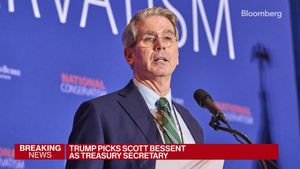A jury has returned verdicts for two individuals involved in a human smuggling case linked to the tragic deaths of an Indian family who froze at the Canada-U.S. border during severe weather conditions.
During the federal trial held in Fergus Falls, Minnesota, prosecutor's painted Harshkumar Ramanlal Patel, who went by the alias "Dirty Harry," and Steve Shand, as key figures within a sophisticated smuggling operation. Each faced numerous charges associated with the human trafficking of Indian nationals aiming to enter the United States.
Testimony revealed how Patel coordinated the operation, directing Shand, who acted as the driver, to pick up would-be migrants from the U.S. side of the border. Only seven out of eleven migrants who attempted the perilous crossing survived the harsh conditions, which included sub-zero temperatures during the January blizzard of 2022.
The unfortunate family—Jagdish Patel, his wife Vaishaliben, their 11-year-old daughter Vihangi, and 3-year-old son Dharmik—embarked on this dangerous trek, suffering fatal consequences from exposure to the brutal cold. Their bodies were discovered just metres away from the United States border, huddled together, emphasizing the horror of their situation.
The jury heard harrowing accounts from survivors of the trek. One survivor described being left stranded among the snow and darkness for hours before finding help, underlining the desperate measures some are willing to undertake for migration.
The federal prosecutors described the smugglers as ruthless, willing to jeopardize lives for financial gain. U.S. Attorney Andrew Luger denounced their actions, stating, "To earn a few thousand dollars, these traffickers put men, women, and children in extraordinary peril... A father, mother, and two children froze to death in sub-zero temperatures."
Defense attorneys presented mixed arguments, claiming Shand had been unknowingly involved under Patel's direction, after being placed within the operation without full awareness. Patel's lawyers insisted their client had been misidentified and claimed the prosecution's case relied heavily on untrustworthy testimonies.
The trial's proceedings included compelling testimonies from border agents and forensic experts, shedding light on how human smuggling networks operate. It revealed how victims often pay exorbitant sums, sometimes up to $100,000, to be smuggled across to North America, and how many repay this debt through grueling low-wage jobs.
During deliberations, the jury took less than 90 minutes to reach their verdict, showcasing the strength of the evidence presented. U.S. Attorney Luger expressed, "When a jury deliberates for two hours or less, it’s an indication the evidence was overwhelming."
Sentencing dates have been tentatively set for 2025, with the maximum sentences for these offenses reaching significantly high figures, potentially twenty years of imprisonment. The swift verdict was seen not only as justice for the deceased family but also as a message to those involved in similar human trafficking schemes.
The incident brings to light broader discussions surrounding illegal immigration, particularly from India, where various factors, including economic hardship and political instability, drive many to attempt dangerous crossings. Increased arrests of Indian nationals at the Canada-U.S. border have been noted, creating urgency for authorities to address these dire circumstances.
Similar cases and the increasing fatalities from such journeys have reignited discussions about the need for comprehensive immigration reform, aiming to prevent such tragedies from occurring again. The family left behind grieving relatives who expressed disbelief at the tragedy, raising questions about accountability for those who profit from human suffering.



